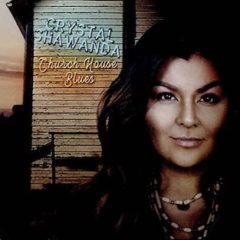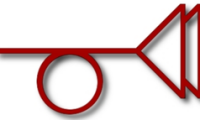
Crystal Shawanda: …bringing deeper wells of emotion to her performances, resulting in Church House Blues balancing personal misfortune with spiritual redemption
By David McGee
 CHURCH HOUSE BLUES
CHURCH HOUSE BLUES
Crystal Shawanda
True North Music
An indigenous artist raised on the Wikwemikong reserve near Ontario, Canada, Crystal Shawanda is making a major move with her fourth blues album, Church House Blues. Listeners are forgiven for hearing shades of Dana Fuchs in her timbre and phrasing, and that’s a compliment. That is to say, whereas the whiskey-voiced blues belter remains in full vigor here, she’s also bringing deeper wells of emotion to her performances, resulting in Church House Blues balancing personal misfortune with spiritual redemption. She comes roaring out of the gate with the ferocious, rocking title track, wailing about “going down to the church house to get my Sunday morning right” after a rousing Saturday night, a moment of redemption that sets up “Evil Memory,” the first of several deep, dark heartbreakers to follow, this one with an austere soundscape of slow-boiling percussion, guitars and keys showcasing Ms. Shawanda pitilessly dissecting a corrosive relationship.

‘Rather Be Alone,’ Crystal Shawanda, from Church House Blues

‘Hey Love,’ Crystal Shawanda, from Church House Blues
Elsewhere, she exults in finding strength and peace in solitude in the grinding missive, “Rather Be Alone” (“…when it’s wrong it’s just wrong/and I’d rather be alone…”), dramatically enhanced by DeWayne Strobel’s richly textured, upper neck guitar sorties, and new resolve in rising above the maelstrom in the gospel-tinged ballad, “Bigger Than the Blues,” where Strobel’s cascade of guitar tears complements the struggle the singer describes. On board to support Ms. Shawanda’s flights into the stratosphere or into the depths, the McCrary Sisters also exert and assert their gospel presence, both exuberantly and sotto voce, throughout, upping the emotional ante whenever they appear. Lighter moments surface here and there too—“Hey Love” is a bouncy, upbeat, pop-inflected celebration of an ex-lover’s selflessness in helping her rebound, and the herky-jerky workout of “Blame It On the Sugar” is the lively ambience shaping a confession of lusty attraction to someone she describes as being “like the frosting on a birthday cake”–but the heartbreakers are truly majestic and augur well for what comes next.



